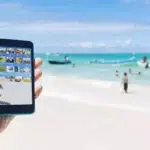Now Reading: Solo Travel Safety Tips: What Every Traveler Must Know Today
-
01
Solo Travel Safety Tips: What Every Traveler Must Know Today
Solo Travel Safety Tips: What Every Traveler Must Know Today

Traveling alone can be one of the most exciting experiences you’ll ever have. But it also comes with its own set of challenges, especially when it comes to staying safe.
Imagine exploring new places with confidence, knowing you have the right tips to protect yourself. This guide is packed with easy, practical advice that every solo traveler must know before taking off. Keep reading, because your safety is the key to making your trip unforgettable for all the right reasons.
Planning Ahead
Planning ahead is key to solo travel safety. It helps avoid many problems. Careful preparation gives peace of mind. You feel confident and ready for your trip. Small steps taken before leaving can make a big difference.
Research Your Destination
Learn about the place you will visit. Check local customs and laws. Find safe areas and places to avoid. Look for health risks and travel warnings. Knowing your destination helps you stay alert. It reduces surprises and keeps you safe.
Share Your Itinerary
Tell a trusted friend or family member your plans. Share flight details, hotel addresses, and daily activities. Update them if plans change. This way, someone knows where you are. It helps in emergencies or if you lose contact.
Choose Safe Accommodation
Pick hotels or hostels with good reviews. Check safety features like locks and lighting. Avoid isolated places far from main streets. Stay near public transport or busy areas. Safe accommodation supports a worry-free trip.
Packing Smart
Packing smart is key to solo travel safety. Carrying the right items helps you stay prepared. It also keeps your load light and easy to manage. Focus on essentials that protect and assist you during your trip.
Essential Safety Gear
Bring a small first aid kit with bandages and antiseptic. A whistle can alert others if you need help. A portable phone charger keeps your device powered. Consider a personal alarm for added security. These items fit easily in a daypack or purse.
Documents And Copies
Carry your passport, ID, and travel tickets safely. Make photocopies or take photos of all important papers. Store copies separately from the originals. Email a digital copy to yourself or a trusted contact. This helps you recover documents if lost or stolen.
Travel Light And Secure
Choose a bag that closes securely with zippers or clasps. Avoid overpacking to keep your bag manageable. Use a money belt or hidden pouch for valuables. Keep your bag close in crowded places. Light packing reduces stress and keeps you alert.
Staying Connected
Staying connected is crucial for solo travelers. It helps you share your location and get help fast. Good communication keeps you safe and calm. Always prepare your devices and contacts before and during your trip.
Local Sim Cards And Wi-fi
Buy a local SIM card to save money on calls and data. It gives you a local phone number and better coverage. Use public Wi-Fi spots carefully. Avoid sensitive tasks on open networks to protect your data.
Emergency Contacts
Save important phone numbers on your phone and on paper. Include local emergency services, your country’s embassy, and trusted friends. Share your travel plans with someone back home. Check in regularly to let them know you are safe.
Travel Apps For Safety
Download apps that help in emergencies. Some send your location to trusted contacts. Others provide local emergency numbers or safety tips. Keep your phone charged and ready to use these apps anytime.
Navigating Safely
Traveling alone offers freedom and adventure. Staying safe while moving around is key. Understanding how to navigate safely helps avoid trouble. It keeps your trip fun and stress-free.
Below are important tips to help you move around safely in new places.
Use Trusted Transportation
Choose transportation options that locals trust. Use official taxis or ride apps with good reviews. Avoid unmarked cars or rides from strangers. Check schedules and routes before you travel.
Plan your trip to avoid waiting alone at night. Keep important addresses handy to show the driver.
Avoid Risky Areas
Some places are unsafe for travelers. Research areas to avoid before you arrive. Stay in well-lit, busy streets. Avoid empty parks or quiet neighborhoods at night.
Ask locals or hotel staff about safe zones. Trust your feelings. Leave if a place feels uncomfortable.
Blend In With Locals
Dress like the people around you. Avoid flashy clothes or expensive jewelry. Learn basic phrases in the local language. This shows respect and helps you communicate.
Observe local customs and behaviors. Acting like a local reduces attention from thieves. Stay calm and confident as you explore.
Personal Security Habits
Personal security habits play a big role in safe solo travel. Staying alert and cautious helps you avoid risky situations. Simple actions can protect you and make your trip more enjoyable. These habits become a natural part of your travel routine.
Stay Aware Of Surroundings
Pay attention to people and places around you. Notice unusual behavior or anything that feels wrong. Avoid distractions like staring at your phone for long. Keep your belongings close and watch crowded areas carefully. Being alert helps you spot trouble early.
Trust Your Instincts
Your gut feeling is a powerful tool for safety. If something feels off, act on it quickly. Leave a place or situation that makes you uncomfortable. Don’t ignore small warning signs. Listening to your instincts can prevent harm.
Limit Alcohol Consumption
Alcohol lowers your awareness and slows reaction time. Drink less to stay sharp and in control. Avoid accepting drinks from strangers. Staying sober helps you make better decisions. Being clear-headed keeps you safe during your travels.
Handling Emergencies
Emergencies can happen anytime during solo travel. Knowing how to handle them keeps you safe and calm. Preparation and quick action are key. Understanding local systems and having the right resources ready makes a big difference.
Know Local Emergency Numbers
Every country has unique emergency numbers. Write them down before your trip. Save them on your phone too. Common numbers include police, ambulance, and fire services. Knowing these helps you get fast help in danger.
Ask locals or your accommodation for the correct numbers. Sometimes, numbers differ by region. Double-check to avoid confusion in stress.
Seek Help When Needed
Never hesitate to ask for help. Look for police officers or trusted locals nearby. Use your phone or public phones to call emergency services. Stay calm and speak clearly about your situation.
Explain your location simply. Show any necessary documents or ID. Getting help early can prevent bigger problems.
Travel Insurance Tips
Travel insurance protects you from unexpected costs. Choose a plan that covers medical emergencies and theft. Keep a copy of your insurance policy with you.
Know how to contact your insurance provider quickly. Keep the emergency numbers of your insurance handy. This saves time during urgent cases.
Frequently Asked Questions
What Are Essential Safety Tips For Solo Travelers?
Always research your destination thoroughly before traveling. Share your itinerary with trusted contacts. Stay in well-reviewed accommodations and avoid risky areas. Keep your valuables secure and stay alert in unfamiliar surroundings. Trust your instincts and avoid unsafe situations.
How Can Solo Travelers Stay Safe At Night?
Avoid walking alone in poorly lit or isolated areas. Use reliable transportation like registered taxis or rideshares. Inform someone about your whereabouts. Stay in public, busy places when possible. Carry a personal safety device such as a whistle or pepper spray.
Should Solo Travelers Carry Emergency Contacts?
Yes, always carry a list of emergency contacts. Include local emergency services, your country’s embassy, and trusted friends or family. Save these numbers on your phone and keep a written copy with you. This ensures quick help during any unexpected situations.
How Can Solo Travelers Protect Their Belongings?
Use anti-theft bags or backpacks with secure zippers. Keep valuables close and avoid displaying expensive items. Use hotel safes to store important documents and extra cash. Stay vigilant in crowded places to prevent pickpocketing. Pack light to manage your items easily.
Conclusion
Traveling alone can be safe and fun with the right steps. Stay aware of your surroundings at all times. Keep your belongings close and secure. Trust your gut feeling; it often guides well. Plan your trips carefully and share plans with someone.
Use technology wisely to stay connected and informed. Respect local customs to avoid trouble. Enjoy your journey with confidence and care. Safety helps you relax and enjoy every moment. Solo travel opens new doors stay smart and stay safe.
Visit here for more information: sustainable travel tips























